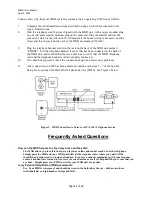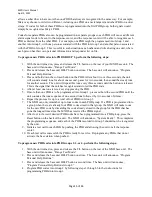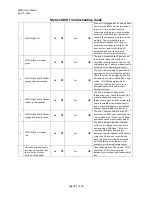
MXD Users Manual
April 5, 2012
Page 25 of 26
The telephone company may make changes in its facilities, equipment, operations or procedures that
could affect the operation of the equipment. If this happens, the telephone company will provide advance
notice in order for you to make necessary modifications to maintain uninterrupted service.
Interference Information:
FCC Rules Part 15: The MXD complies with Part 15 of the FCC Rules.
Operation is subject to the following two conditions: (1) this device may not cause harmful interference,
and (2) this device must accept any interference received, including interference that may cause undesired
operation.
Note
: Your MXD has been tested and found to comply with the limits for a Class B digital device,
pursuant to Part 15 of the FCC Rules. These limits are designed to provide reasonable protection against
harmful interference in a residential installation. This equipment generates, uses, and can radiate radio
frequency energy and, if not installed and used in accordance with the instructions, may cause harmful
interference to radio communications. However, there is no guarantee that interference will not occur in a
particular installation. If this equipment does cause harmful interference to radio or television reception,
which can be determined by turning the equipment off and on, the user is encouraged to try to correct the
interference by one or more of the following measures:
Move the MXD away from your radio or television
Plug the MXD into a different power outlet than your radio or television.
Reorient or relocate the receiving antenna.
Consult the dealer or an experienced radio/TV technician for help.
Infrequently used radio links should be tested regularly to protect against undetected interference or fault.
The Manufacturer suggests at least weekly.
A general knowledge of radio and its vagaries should be gained prior to acting as a wholesale distributor,
dealer, or installer and these facts should be communicated to the ultimate user.
ACTA (Administration Council for Terminal Attachments) Information:
This equipment complies with Part 68 of the FCC rules and the requirements adopted by the ACTA. On
the bottom of this equipment is a label that contains, among other information, a product identifier in the
format US: AAAEQ##TXXXX. If requested, this number must be provided to the telephone company.
A plug and jack used to connect this equipment to the premises' wiring and telephone network must
comply with the applicable FCC Part 68 rules and requirements adopted by the ACTA. A compliant
telephone cord and modular plug is provided with this product. It is designed to be connected to a
compatible modular jack that is also compliant. See installation instructions for details.
If your home has specially wired alarm equipment connected to the telephone line, ensure that the
installation of the MXD does not disable your alarm equipment. If you have questions about what will
disable alarm equipment, consult your telephone company or a qualified installer.
Caution
: In order for
“
alarm dialing equipment
”
to be able to seize the phone line to report an alarm
or other event when other customer equipment (telephone, answering system, computer modem, etc.)
connected to the same line is in use,
“
alarm dialing equipment
”
must be connected to a properly
installed RJ31X jack. The RJ31X jack must be connected in series with, and ahead of, all other
equipment attached to the same phone line. Series installation of an RJ31X jack is depicted in Figure 11.
If you have any questions concerning these instructions, you should consult your telephone company or a
qualified installer about installing the necessary jack and alarm dialing equipment for you.


































